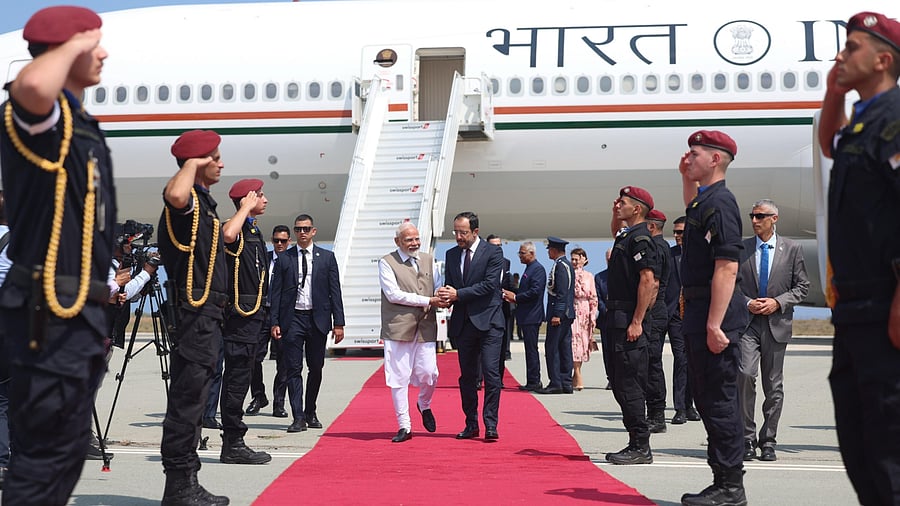
Modi was received by Cypriot President Nikos Christodoulides, who, himself, drove to the airport to welcome the prime minister.
Credit: X/@narendramodi
New Delhi: Prime Minister Narendra Modi on Sunday commenced a two-day tour to Cyprus – a visit intended to send a message to Türkiye, which has been an adversary of the Mediterranean Sea island nation and which irked New Delhi by overtly supporting Islamabad when the India-Pakistan conflict reached a flashpoint last month.
India is likely to utilise the prime minister’s visit to expand its economic ties with Cyprus, which can serve as a gateway to the Mediterranean and the European Union. With the Israel-Iran flare-up added to the instability in West Asia, resulting in uncertainty over the proposed India–Middle East–Europe Economic Corridor, New Delhi is keen to embark on an India-Cyprus economic corridor.
Modi was received by Cypriot President Nikos Christodoulides, who, himself, drove to the airport to welcome the prime minister.
Christodoulides is expected to accompany Modi on a visit to the ‘Green Line’, a demilitarised buffer zone, patrolled by the United Nations peacekeeping force, between the Greek Cypriot (internationally recognised Republic of Cyprus) in the south and the Turkish Cypriot (recognised only by Türkiye) in the north of the island.
“Landed in Cyprus. My gratitude to the President of Cyprus, Nikos Christodoulides, for the special gesture of welcoming me at the airport,” Modi posted on X after he arrived in Nicosia. “This visit will add significant momentum to India-Cyprus relations, especially in areas like trade, investment and more.”
Modi’s visit to Nicosia came almost 23 years after the one by Atal Bihari Vajpayee, who was the last prime minister to travel to the capital of Cyprus.
“Welcome to Cyprus, Prime Minister @narendramodi! Here, at the EU’s southeastern frontier and gateway to the Mediterranean…A historic visit…A new chapter in a strategic partnership that knows no limits,” Christodoulides posted on X. “We make a promise to advance, transform, and prosper more. Together”
Christodoulides said that he and Modi would discuss connectivity between India and Europe through the region of the wider Middle East, as well as through Cyprus.
The two leaders are likely to lead respective delegations for a formal dialogue on Monday.
Modi will later leave for Kananaskis in Canada to attend an outreach session, which will be held on the sidelines of the G7 summit.
The prime minister’s visit to Cyprus was part of New Delhi’s continuing bid to reach out to regional adversaries of Türkiye, which often extended support to Pakistan on the issue of its dispute with India on the issue of Kashmir. India is also seeking to deepen and expand ties with Armenia and Greece, which have complex and troubled relations with Türkiye.
Türkiye sent a warship and military cargo planes to Pakistan after the April 22 carnage in J&K escalated tension between the two South Asian neighbours. Pakistan used Axisguard Songar drones made in Türkiye to target civilian and military installations in India during the cross-border flare-up between the two South Asian nations between May 7 and 10.
New Delhi recently called upon Türkiye to be mindful of the sensitivities of India and to strongly urge Pakistan to end its support to cross-border terrorism and take credible and verifiable actions against the terror ecosystem it has harboured for decades.
Türkiye invaded Northern Cyprus in 1974 in response to a coup aimed at unifying the island with Greece. Türkiye did not withdraw its troops from Cyprus even after the internationally recognised government was reinstated with control over two-thirds of the island. The remaining one-third in the northern region of the island remained under a government remotely controlled by Türkiye.
In response to Ankara-Islamabad bonhomie, India inked an MoU on defence cooperation with Cyprus in 2022 and followed it up with a Bilateral Defence Cooperation Programme (BDCP) for 2025 on January 23 this year.
